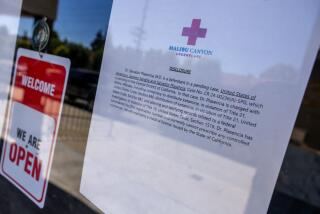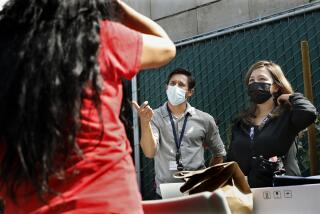Controversy Continues to Dog Tennant : Drug testing: Latest debate on West Covina doctor’s ability might cost him position with NFL.
- Share via
Forest Tennant shy away from controversy?
Four years ago, the West Covina physician was asked about his penchant to irritate everyone from Los Angeles County politicians to the NFL Players Assn.
“I’ve not only ruffled some feathers, I’ve run them over like a steamroller,” he said in an interview in 1986. “If I don’t have some adversaries out there, I’m not accomplishing anything.”
As one of the country’s best-known drug doctors and former mayor of West Covina, Tennant has accomplished plenty in the last 20 years.
Yet, all the while he has received recognition for good deeds, his image has been tarnished by criticism of incompetence. Tennant’s abilities were questioned again this week after a Washington television report was critical of his role as NFL drug adviser.
In a news conference Friday, Commissioner Paul Tagliabue of the NFL did little to dispel rumors that Tennant, 49, will soon be fired by the league.
Longtime observers of Tennant were not surprised by the latest debate. Consider:
--In 1983, Tennant apparently reversed himself on the witness stand during a highly publicized trial involving drug overdoses by an Orange County doctor. Based on Tennant’s report, the Orange County District Attorney’s office prosecuted the case. When Tennant offered a different account on the stand, the case was dismissed.
--In 1984, as head of the Dodgers’ drug prevention and treatment program, Tennant told a newspaper reporter that he had a list of players involved with drugs, which surprised team officials.
--In 1984-85, Community Health Projects Inc., a nonprofit network of drug clinics in Southern California founded by Tennant in 1974, had problems with the State Department of Health Services. A state agency audit found discrepancies in billing procedures to Medi-Cal. Tennant denied any wrongdoing, but the company was ordered to pay reimbursements for overcharges. It was one of several times it was ordered to do so.
--In 1986, L.A. County health officials registered their concern over the maintenance of Community Health’s methadone program. Community Health Projects eventually canceled its $272,000-a-year contract with the county to provide methadone treatment for indigent heroin addicts.
--In 1986, Tennant conducted a public feud with L.A. County Supervisor Pete Schabarum over the construction of waste-to-energy incinerators in the San Gabriel Valley.
--In 1986, as newly appointed NFL drug adviser, Tennant disclosed plans to specially monitor six New England Patriot players for drug use. The Players Assn. accused Tennant of violating rules of confidentiality and called for his removal.
--In 1988, Tennant told a group of Alaskan businessmen that the Dodgers’ success that season was partly traceable to management’s alleviation of the team’s drug problem. Dodger officials expressed disappointment over the remarks, and Tennant later was dismissed as the team’s drug adviser.
--In 1989, a report in Sports Illustrated characterized problems with the NFL’s drug-testing methods in which Tennant was in charge.
Last summer, Tennant told The Times that the magazine article was untrue.
“This whole story is nonsense,” he said. “I’m a public figure. I never thought as a physician that I would get the kind of criticism that I get in the media from time to time.”
--Also in 1989, Tennant’s rapid-eye exam, a home drug-prevention kit, was criticized by some drug-testing experts, doctors and a Boulder (Colo.) superior court judge. The rapid-eye exam, which sells for $49, has prompted a debate as to whether it is an effective tool or a gimmick to make money from the concern over drugs.
Tennant told The Times that his detractors do not understand the eye exam. He said that when used properly, the test can stop drug use in the home.
Friday, Tennant was not defending himself from the latest volley.
Sandy Ethridge a spokeswoman for Community Health Projects, said: “Dr. Tennant is very hopeful there is a time when he can speak openly about all this.”
Tennant’s lack of comment is uncharacteristic.
As a farm boy from Dodge City, Kan., Tennant worked his way through the University of Kansas Medical School by selling crystal and fine china door to door.
Like his parents who had sold Bibles in the Midwest during the Depression, Tennant learned the importance of personal contact.
“It paid off handsomely,” he said in 1986. “I got used to having people who didn’t like me.”
In 1968, two years after earning a medical degree from Kansas, Tennant was an Army surgeon based in West Germany. There, his profession took an alternate course as he learned of the Army’s drug problem.
He used information gleaned from treating service personnel as the basis for a doctorate thesis at UCLA School of Public Health in 1972. Then, as a post-doctorate fellow, Tennant was appointed director of UCLA’s methadone program.
The school rented a building in West Covina, where Tennant’s staff dispensed methadone daily to heroin addicts. This eventually became the basis for Community Health Projects, which has grown into a multimillion-dollar operation.
Because of the organization’s recognition from work with professional athletes, Tennant was often called to testify as an expert witness in drug trials. Also, he has been a consultant to the California Highway Patrol, teaching officers how to recognize symptoms of drug use. His rapid-eye exam has been praised by law enforcement authorities as an effective means in field sobriety tests.
The test today is whether Tennant can withstand the mounting criticism. Judging from his past, his supporters believe he will weather this latest storm.
“Whatever his personality is,” an Orange County physician once said, “his work is what really is important.”
More to Read
Sign up for Essential California
The most important California stories and recommendations in your inbox every morning.
You may occasionally receive promotional content from the Los Angeles Times.













